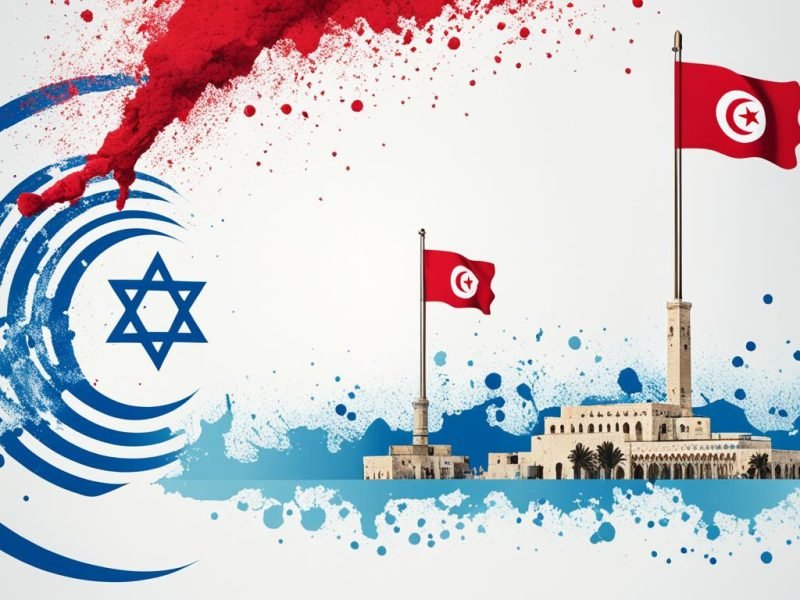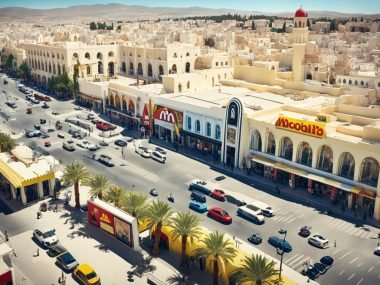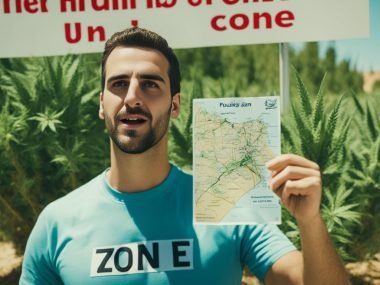Exploring Middle East diplomacy leads me to the Tunisia-Israel connection. My first visit to Tunis showed me the deep discussions on peace and resistance. This set the stage to uncover the unique relationship between Tunisia and Israel.
Being in Tunisia showed me how its people and leaders handle global relationships. They navigate the history and today’s challenges with care. This approach shapes how Tunisia interacts with Israel, blending history and current politics.
Key Takeaways
- Tunisia and Israel have a complex history but do not have official diplomatic ties now.
- Tunisian President Kais Saied has been critical of Israel. This affects Tunisia’s foreign policy.
- The history and secret talks with Israel show the depth of Tunisia’s diplomatic story.
- Events like Israel’s Operation Wooden Leg in 1985 deeply affected their relationship.
- They once had limited diplomatic relations, stopped by regional tensions and the Second Intifada.
- President Saied’s actions, like pausing laws about Israel, highlight the ongoing complexities in their ties.
Unveiling Tunisia-Israel Relations: A Complex Narrative
Exploring Tunisia’s stance towards Israel uncovers a story filled with secret talks and sudden political shifts. As a journalist, I’ve seen how past agreements and conflicts have shaped their relations. This history shows how both countries view peace and diplomacy in their region today.
The Genesis of Tunisia-Israel Diplomatic Interactions
In the late 1950s, meetings between Tunisian leaders and Israeli officials were very secretive. President Habib Bourguiba and others initiated a non-aggressive approach towards Israel. These early, discreet meetings set the tone for Tunisia’s peace efforts in the region.
From Bourguiba’s Secrecy to Ben Ali’s Clandestine Contacts
President Zine El Abidine Ben Ali continued Tunisia’s secret talks with Israel, despite public opposition. These discussions indicated a desire for peace and understanding, even amid controversy.
Breaking Ties: The Second Intifada’s Impact on Bilateral Relations
The Second Intifada greatly affected Tunisia-Israel relations. President Ben Ali cut ties quickly, reflecting the conflict’s impact. This move showed Tunisia’s strong solidarity with the Palestinian cause, a feeling that remains strong.
| Event/Milestone | Significance for Tunisia-Israel Relations | Outcome/Consequence |
|---|---|---|
| 1950s Diplomatic Exchanges | Foundational interactions, affirming non-aggression and regional peace | Laid groundwork for future secret interactions |
| Madrid Conference (1991) | Catalysed formal communication channels | Opening of ‘Interest Sections’ in 1996 |
| Second Intifada (2000) | Resurfaced the volatility of the Tunisia-Israel conflict | Severing of nascent diplomatic ties |
Understanding these changing stories is key to grasping Tunisia’s current diplomatic stance. The history of secret talks and sudden breaks builds the foundation of the Tunisia-Israel relationship. It’s a dynamic marked by both complexity and caution.
Understanding Tunisia’s Stance in the Israel-Palestine Conflict
The Middle East’s geopolitical scene is full of complex stories. Tunisia’s unique position in the area is fascinating. Its involvement in the Israel-Palestine dispute shows a complex attitude. This changes with the political scene and the ongoing quest for peace.
Tunisia’s Contribution to Secret PLO-Israel Talks
Tunisia’s quiet role in critical talks is well-documented. It has hosted key negotiations, shaping the Israel-Palestine conflict’s path. One key event was supporting secret PLO-Israel talks, leading to the Oslo I Accord. This was a big step towards peace.
President Kais Saied’s Approach to the Conflict
President Kais Saied has taken a strong stance against normalising ties with Israel. This is in response to Israel’s actions in Gaza. Saied’s approach has reignited Tunisia’s support for Palestine. It has also sparked debate in Tunisia about its role in the conflict.
| Period | Tunisia’s Position | Impact on PLO-Israel Relations |
|---|---|---|
| Early 1990s | Openness to formalising ties with Israel | Facilitated communication channels and tourist interchange |
| Post-Oslo Accords | Tunisia hosts crucial talks, leading to a peace accord | Oslo I Accord signed, setting groundwork for future negotiations |
| Current Presidency | Kais Saied reaffirms support for Palestine; opposes normalisation | Heightened tensions, with Tunisia maintaining a firm stance in international forums |
I’ve been closely watching Tunisia’s complex role in the Israel-Palestine conflict. The shifts in its foreign policy have big effects on Middle Eastern diplomacy. It remind us how smaller nations can influence major international issues. They can either help solve conflicts or make them worse.
Tunisia’s Legal Framework Against Normalization with Israel
Tunisia’s legal conflicts with Israel show a strong stance against normalization. Tunisian laws are clear about the dangers of connecting with Israel. These discussions in parliament show a united front against warming relationships.
Normalization with Israel is seen as a major wrongdoing in Tunisia. The laws are strict, leading to jail time and big fines. This shows Tunisia’s deep commitment to its own values and support for Palestinians.
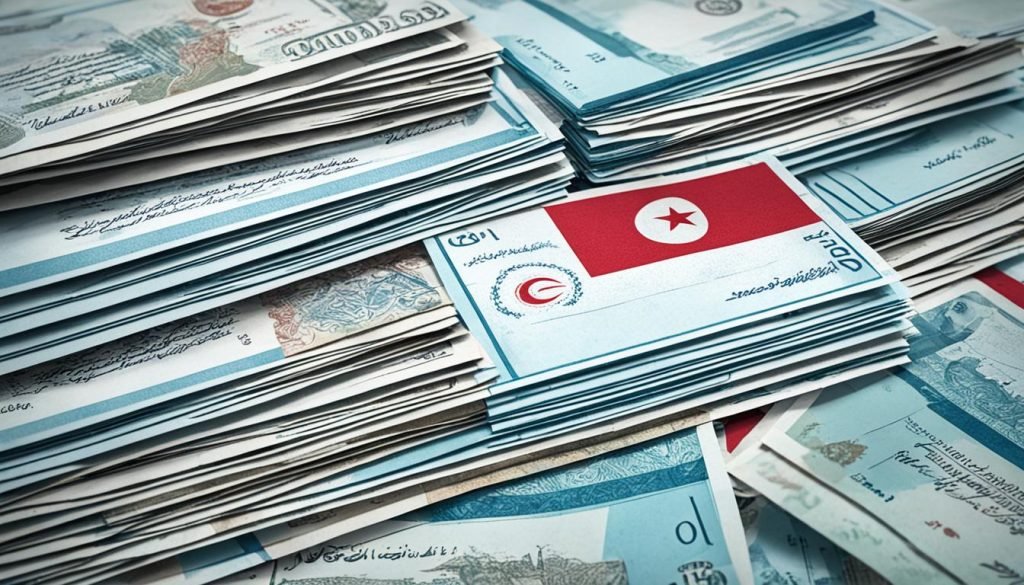
To understand Tunisia’s legal steps against normalization, here’s a table comparing proposed actions and punishments:
| Type of Engagement | Proposed Legal Action | Punishment Severity |
|---|---|---|
| Collaboration with Israeli Entities | Criminal Prosecution for High Treason | Maximum Penalty (Imprisonment and Fines) |
| Indirect Contact with Israeli Entities | Legal Investigation, Possible Prosecution | Moderate to Severe (Dependent on Circumstances) |
| Promoting Normalisation Publicly | Legislative Condemnation | Significant Fines and Social Ostracisation |
These legal steps show how Tunisia feels about the Israel-Palestine situation. As a journalist, I see this as a symbol of Tunisia’s legal stance and societal values. In conclusion, Tunisia’s laws show a firm stand against normalization, echoing deeper issues in Tunisia-Israel relations.
The Ebb and Flow of Diplomatic Gestures: Interest Sections to Proposed Bills
Over the years, Tunisia-Israel relations have seen on-and-off diplomatic efforts. These efforts showed times when peace seemed possible. Yet, the quick fading of such initiatives teaches us about their potential in shaping future ties.
A Tale of Two Interest Sections: Brief Hope of Amity
In the 1990s, Tunisia and Israel opened Interest Sections in each other’s countries. This was a hint of better relations, yet it didn’t last long. These sections were like a silent recognition of shared interests, hinting at a chance for cooperation. Sadly, this hopeful moment didn’t last.
President Saied’s Legal Intervention: The Bill on Ties with Israel
More recently, President Kais Saied played a key role in Tunisia-Israel relations. He stopped a bill that would make normalizing ties with Israel a crime. This decisive action shows the complex stance Tunisia takes on its relationship with Israel.
| Period | Action | Result |
|---|---|---|
| 1990s | Establishment of Interest Sections | Temporary diplomatic engagement |
| Recent Years | Intervention by President Kais Saied | Stalled bill criminalizing normalization with Israel |
Do Tunisia Support Israel? A Scrutiny of Current Affairs
As a journalist delving into Middle Eastern geopolitics, Tunisia’s stance on Israel catches my eye. It’s not straight forward. My findings show a complex relationship with Tunisia-Israel agreements that go against the usual critical views. Tunisia even joins in global activities where working with Israel happens for real.
“Balancing act” fits when talking about the Israel-Tunisia cooperation seen now and again. At the same time, Tunisia doesn’t back down from its tough views on Israel’s government. This shows the challenge of matching national interests with the people’s feelings, who often feel for the Palestinian cause.
| Aspect of Relations | Instances of Cooperation | Official Stance and Actions |
|---|---|---|
| Military and Security | Participation in multinational naval exercises including Israeli forces | Critical public statements condemning Israel’s military actions |
| Diplomatic Gestures | Opening of interest sections in the 1990s | Retraction of earlier diplomatic moves and hardline anti-normalisation laws |
| Political Engagement | Consistent voting patterns at the United Nations | Support for Palestinian statehood and self-determination resolutions |
Understanding the Tunisia-Israel agreements needs a look back in history. These deals don’t follow normal patterns but show unexpected practical choices at times. It’s clear when we see the Israel-Tunisia cooperation change over the years. It keeps me watching closely for what future developments might bring to this intricate story.
The Role of Tunisia in Multinational Strategies and Cooperation
I have been focusing on how different countries work together. I noticed Tunisia’s active role globally. For example, Tunisia joined the Sea Breeze exercises willingly. This shows its intent to work with others despite its cautious stance towards Israel.
The Sea Breeze drills are a group effort, including countries with challenging histories. Tunisia works with Israel here, showcasing diplomacy that respects its past while addressing current security needs.
Tunisia’s Participation in International Naval Exercises
Tunisia’s engagement in Sea Breeze highlights its commitment to global security. It aims for peace in the Mediterranean and further. This action is central to Tunisia’s foreign strategy.
Assessing Tunisia’s Foreign Policy Objectives
To comprehend Tunisia’s foreign policy, we need to see its dedication to worldwide goals. It takes part in international projects to strengthen its global position. Tunisia seeks safety and economic growth, aiming for national development and cooperation in the region.
| Year | Exercise | Participating Countries | Tunisia’s Role |
|---|---|---|---|
| 2021 | Sea Breeze | 32 Nations including Israel | Naval participation to enhance maritime security |
Cultural Interactions and Contentions
In my time covering the Middle East, I’ve seen how cultural exchanges between Tunisia and Israel and Israel-Tunisia sporting events play a big role. They act as venues for both diplomacy and disagreement. Such events show how political relationships can affect sports and culture.
Take tennis for example. The tension is clear when Tunisian players choose not to play against Israelis. It’s not just about the game. It’s a silent protest, signalling political and national viewpoints.
This decision, though, has affected Tunisia’s role in global sports. They were even suspended from the Davis Cup. This shows how political issues can impact sports competitions.
I’ve put together instances that show the complex relationship between Tunisia and Israel:
| Event | Year | Action | Result |
|---|---|---|---|
| Player Withdrawal | 2013 | Tunisian withdrawal from match against Israeli player | Spectacle of political stance over sportsmanship |
| Davis Cup Suspension | 2013 | Suspension of Tunisia from Davis Cup | International critique and sports controversy |
| Sporting Event Scrutinies | Ongoing | Heightened scrutiny of Israeli athletes in Tunisian events | Contentious atmosphere impacting sports diplomacy |
These stories aren’t just sports news. They show deeper political feelings. They reveal how sports fields become places where bigger diplomatic stories play out.
The journey to better relations through cultural exchanges between Tunisia and Israel and Israel-Tunisia sporting events is tough. But it’s not impossible to hope for better times ahead.
Public Opinion and Parliamentary Debate: Domestic Views on Israeli Ties
As a journalist, I delve into the complexities of Tunisian public opinion on Israel. This reveals the gap caused by political and social beliefs. In Tunis’ cafes, chats about parliamentary discussions on Israel-Tunisia ties are as intense as in parliament. The polarised views in public mimic the stiff attitudes seen in politics. Below is a table that shows these different opinions.
| Public Opinion Indicator | Level of Support for Normalisation | Level of Opposition |
|---|---|---|
| Social Media Sentiment Analysis | Low | High |
| Street Interviews & Surveys | Very Low | Very High |
| Parliamentary Vote Intentions | Low | High |
| Academic Analysis | Moderate | Moderate to High |
In my research, I’ve heard passionate opinions. These come from streets and government buildings alike. The talks on possibly making it illegal to normalize relations with Israel show a strong national belief.
This belief is against forming official ties. Such a feeling is so deep it becomes part of the national character.
“We are not against the Jewish people; it’s the state actions we oppose,” is a view I often hear from locals. This highlights the complex thoughts behind Tunisian public opinion on Israel.
- Historical Context: Emphasising past conflicts and present disparities.
- Legislative Actions: Revealing parliamentary zest to table anti-normalisation bills.
- Media Reflecting Public Sentiment: National media serves as a barometer for the prevailing anti-Israel sentiment among Tunisians.
Parliamentary discussions on Israel-Tunisia ties
The political debates, while complex and sometimes bitter, reveal public doubts. These debates spill into the streets, fuelling more discussions among people.
In parliament, these discussions reach a peak. Legislators express their voters’ worries. The strong speeches reflect not just political show but the nation’s feelings.
Tunisia’s Jewish Community Amidst a Tangled Political Landscape
The History of the Jews in Tunisia is both deep and colourful. It is shaped by age-old traditions and a unique culture. I found a vivid picture of life that remains strong despite challenges. Tunisia’s complex society includes the Tunisian Jewish community. Though not always in the limelight, they are a key part of the nation’s mix.
The Historical Presence of Jews in Tunisia
For thousands of years, Jewish settlers in Tunisia have played a big part in its growth. This is especially true in Djerba, showing a long history of living together. The El Ghriba synagogue there is a symbol of their lasting faith and strength.
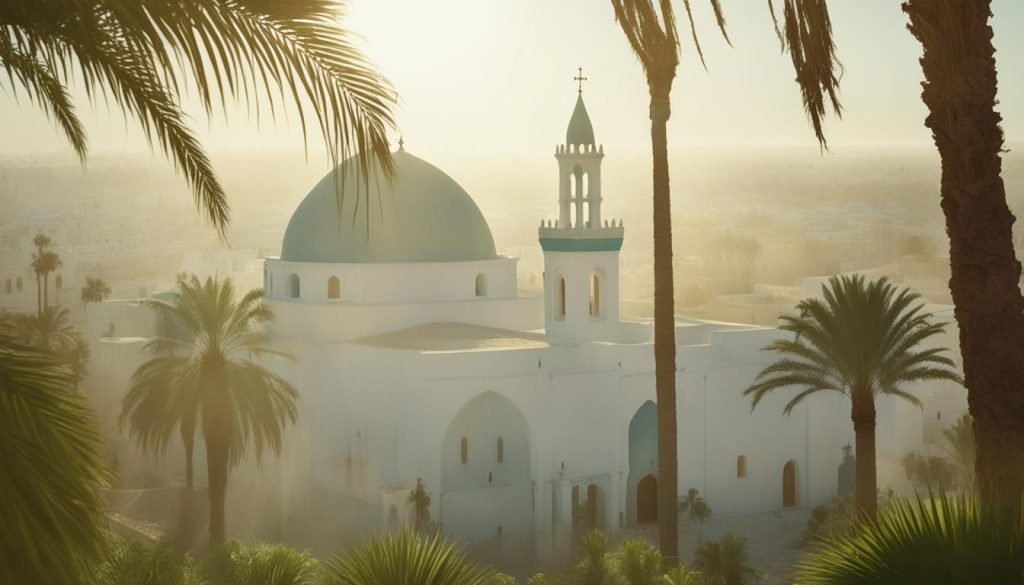
The Impact of Public Sentiment and Legislative Actions on Jewish Tunisians
In Tunisia’s politics, feelings about Tunisian Jews and laws affecting them are mixed. This feeling against making peace with Israel is strong in parliament. This creates tension. It puts Jewish Tunisians in a tricky spot, having to prove their loyalty.
Key moments for them include the 2002 attack on El Ghriba synagogue. This event is crucial for understanding the ties between religion, identity, and politics in Tunisia. It shows the delicate situation the Jewish community faces in a beautiful yet complex land.
| Year | Event | Impact on Tunisian Jewish community |
|---|---|---|
| 2002 | Al-Qaida attack on El Ghriba synagogue | Renewed concerns for safety and assertion of identity |
| 2011 | Revolution and subsequent political shifts | Uncertainty and the question of emigration surfaces |
| Ongoing | Legislative propositions to criminalise ties with Israel | Community’s resilience tested amidst a backdrop of legal constraints |
Conclusion
In my study of the Tunisia-Israel diplomatic story, I’ve seen it’s not straight forward. There has been a mix of private work together, stopped tries at diplomacy, and strict laws against making their relationship normal. As I think about this history, it’s clear these events are still part of Tunisia and Israel’s relationship today. From the first connections in the 1990s to President Kais Saied’s big decisions, these changing moments show a relationship that’s hard to describe easily.
Looking at what people in Tunisia think and what their leaders say, it seems hard for Tunisia and Israel to become friends. Tunisia really supports Palestine, making it tough for these countries to get along. Their relationship is influenced by the politics in the Middle East, global diplomacy, and Tunisia’s own political scene. Each part adds its own layer to the story.
What will happen next between these countries by the sea? My thoughts are that as long as they stick to their views, them coming together looks unlikely. Their standoff, full of big beliefs, will keep getting attention. People watching this will likely see more twists and turns. As they move through the world’s diplomatic game, the questions of ‘if’ and ‘when’ they might get closer are really important.

